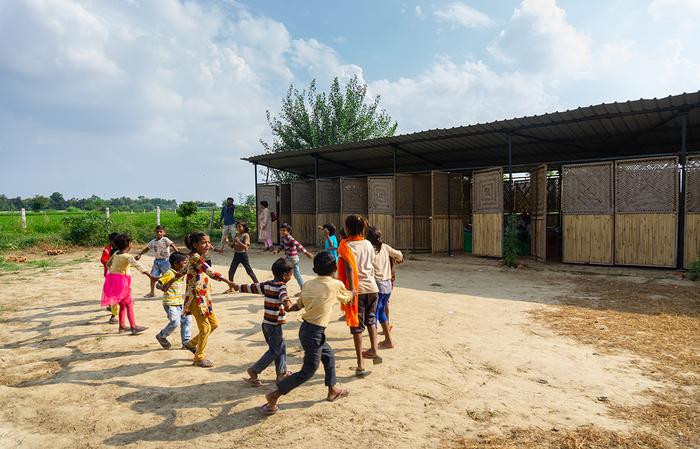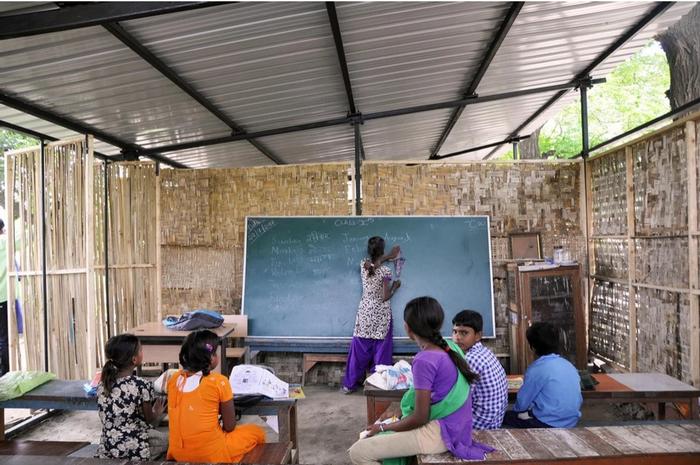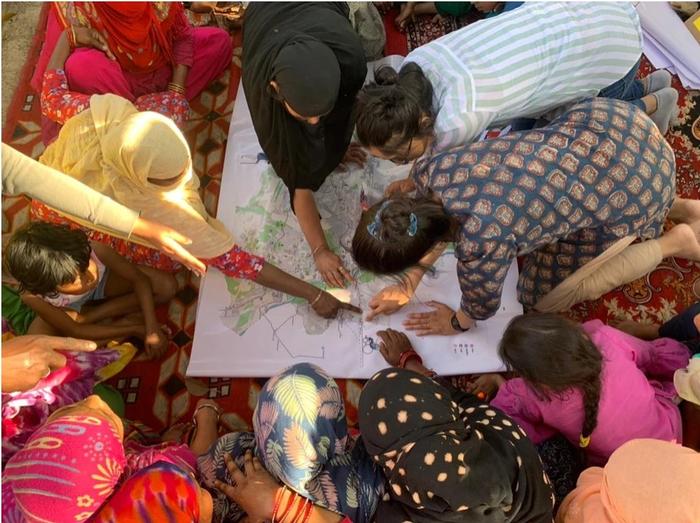M.S. Srinivas - ProposalProposal to Volunteer with Social Design CollaborativeSocial Design Collaborative is a community-driven architecture practice based in Delhi, dedicated to providing underprivileged communities with access to design services. It is a collaborative organisation that works with other professionals such as lawyers and social workers, and other organisations including public and non-profit bodies, to provide communities with holistic design solutions. In my essay, I find that the position of the architect in Delhi is doubly constrained – by their profession, which puts them at the bottom of the food chain, and by the city, where resources are limited. Social Design Collaborative acknowledges these constraints, but with a constructive optimism. Consider the case of the Khadar farming community based on the banks of the river Yamuna. Formal schooling is inaccessible to the children of this community until they are old enough to travel on their own, for which reason a community-run school by the name of ‘Van-Phool’ used to take care of their primary education locally. In 2011, the Delhi Development Authority demolished their entire settlement, leaving them homeless and school-less. Eventually, community representatives obtained a court ruling that they be allowed to set up a school, citing their Right to Education. However, they were given permission only to set up a ‘temporary’ structure. And even if their school were spared, they were still ‘squatters’, and the threat of demolition would continue to loom over their homes. What could they do? In 2015, social worker Abdul Shakeel with the Housing and Land Rights Network approached Social Design Collaborative to address this issue. Working with the community, they came up with ModSkool – a modular, easy-to-dismantle school made of steel frames, and locally available bamboo, reused wood, and dried grass. The school satisfied the criteria of ‘temporary’, while also providing the community with the option of dismantling and relocating the school when faced with eviction. The school has already moved once. Delhi has perhaps more architects than any other city in India, but most of them work in service of a narrow slice of its population. Ironically, design is capable of making a much bigger difference for those who cannot conventionally afford it. For underprivileged communities, design is not just about comfort and identity – it can transform their very world of possibilities. ModSkool, for example, was not just about providing a comfortable space for education; it served as the very instrument through which the community secured their right to education. Therefore, as I note in my essay, such ‘radically pragmatic’, ameliorative designs might be small in scale, but they can be powerful agents of social good. In fact, this might be the most significant way in which an architectural practice can tangibly improve lives in highly constrained environments such as Delhi, where issues are complex and unlikely to be resolved anytime soon. This is exactly the kind of work Social Design Collaborative has been engaged in. However, they also acknowledge that while such designs might make a meaningful difference, they do not address root causes. Therefore, the organisation also attempts to provide systemic and policy level solutions. In particular, they are concerned with the inclusion of vulnerable communities such as the Khadar farmers in the city’s planning processes. They are working towards this by supporting workshops, creating awareness, and equipping communities with tools through which they can exercise their right to the city. Simultaneously, they also undertake research and advocate for these communities at various public bodies, providing stakeholder input or proposing alternate schemes that are more inclusive. By working with Social Design Collaborative, I will be able to understand the practical features of both ameliorative design and inclusive planning. Some questions I expect to find answers to, particularly in the context of Delhi, are: • How are projects conceived within legal and financial restrictions? • How are approvals obtained from relevant authorities? • How are projects financed? • How are stakeholders involved in the design process? • How does the organisation sustain itself? • What are some ways in which we can think about and plan our cities more inclusively? Within its short history, Social Design Collaborative’s work has received significant recognition and acclaim. Their work has been featured in publications such as Landscape Journal, Deezeen, and The Indian Express. In 2020, ModSkool was awarded the Beazley Design of the Year Award for Architecture by the Design Museum, London. I plan to volunteer at the organisation for 6 weeks (14 June to 24 July 2021). During this period, I will be involved in their current engagement with farmers along the floodplains of the Yamuna. In the first few weeks, I will dive into their on-ground work, helping them conduct awareness workshops and interacting with farmers as a part of their ongoing research project. I will also be involved in the design and construction of small projects across the city, participate in their meetings, and contribute to their reports and presentations to understand, in detail, how the organisation functions and collaborates. My expenses will mainly consist of accommodation (since college accommodation will be unavailable during this period) and travel, which would total to about Rs.20,000 (INR) or $270 (USD) per month. The practical training and exposure I receive through my architectural school tends to be more focussed on professional excellence than giving back to society. An opportunity to volunteer with this organisation will, therefore, complement that process. Not only will it serve me as an example of how architecture could be practiced as a social art, but hopefully it will broaden my very sense of what architecture is and what architectural practice could be. Given the flexibility that my architecture school provides, this experience could really inform the dissertation and design thesis that I will undertake in my upcoming year, and consequently my career beyond that. I sincerely hope I will be awarded this opportunity. CONTACT socialdesigncollaborative@gmail.com (Swati Janu, founder) LINKS Website: https://www.socialdesigncollab.org ModSkool on YouTube: https://youtu.be/bfBARDYy_1U Delhi Anganwadi Project on Medium: https://medium.com/@daminirathi/diy-urbanism-and-building-with-the-community-e909668bfe0 Thomson Reuters Foundation: https://news.trust.org/item/20210219063538-fwb8z/ World Architecture Community (includes brief interview): https://worldarchitecture.org/architecture-news/egvfh/modskool-a-modular-tool-twice-embraced-a-children-s-school.html The Indian Express: https://indianexpress.com/article/lifestyle/art-and-culture/how-a-delhi-school-for-farmers-children-along-the-yamuna-riverfront-won-world-recognition-7188172/ Additional Help and InformationAre you in need of assistance? Please email info@berkeleyprize.org. |




